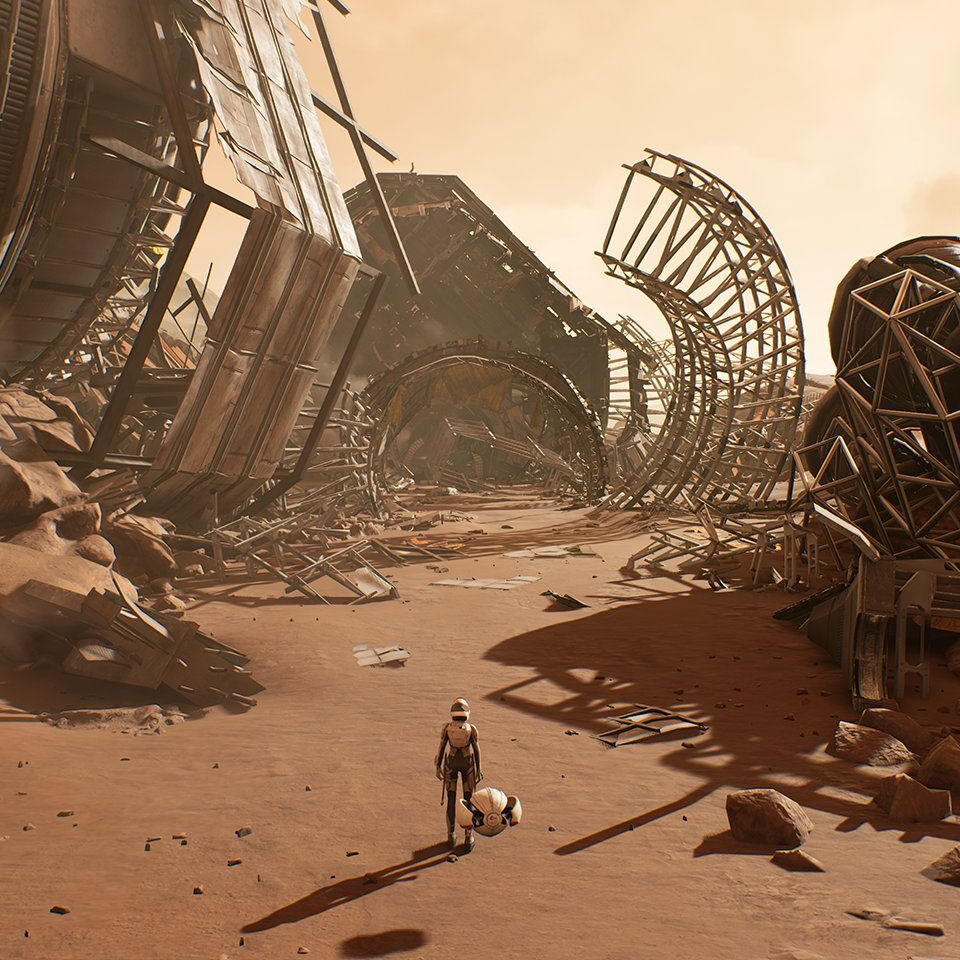Deliver Us Mars tells the strangely grounded tale of Kathy Johanson, an astronaut who goes in search of her father.
Years before, he blasted off toward Mars looking for alternative energy, or something, and never came back. It could well be that he crashed en route, got kidnapped by knee-high Martians with saucer eyes, or, who knows, maybe he lives happily there now, pitching in with a commune of hippyish fellow-travellers, leaving us and our capitalist ideas to rot. Either way, he is missing, presumed red.
Earth, meanwhile, is at its crusty ebb, and we get a few lovely shots of desolation: a vast copper-coloured grid of solar panels, sucking up the chilly rays; a sad daisy chain of radio dishes in the boggy Florida cape. That is where we find Kathy, and her squadmates of Opera Team, as they ride a lift up a spindly tower, launch a rocket, and shrug off the drag of our atmosphere.
That is one of the best scenes in Deliver Us Mars, a game with awe in its heart and melodrama on its mind. It wants to wow you with extra-terrestrial marvels, but its plot is one of those inward, domestic affairs. Kathy may have left Earth, but she is still locked to the constellation of her family. The result is a draining clash, between heavy machinery and heavier pathos, and I wish that the developer, KeokeN Interactive, would have let the technology go about its mission and provide some alternative energy. Look at the launchpad on lift-off day: a perfect blue sky, a shuttle as white as toothpaste, and a command module pointed at the heavens.
It’s a first-person segment, in which you are asked to do little more than press buttons and twist nozzles on a dashboard. But the connection between your twiddling and the progress of the mission – between private gestures and the giant, fiery results, viewed at a remove on a grey monitor – has a nice smack of irony to it. The same means that damned the planet are the ones that may plough ahead and save it. Sure enough, gathered behind chain-link fences is a throng of baying humans, unhappy at the burning of resources.
The rest of the game, meanwhile, is played in third person, which is good news for two reasons. One, it gives us a chance to ogle the spacesuits of Opera Team: spongy and streamlined, with a carroty stripe down the middle and a matte-plastic sheen. Two, it allows KeokeN to provide what we might call ground control: passages of platforming, where the story hangs fire and we chisel and hack our way up cliffs.

These parts are cribbed, wholesale, from Rise of the Tomb Raider, with Kathy swinging a pair of nifty axes. Fair enough. If you are going to plunder, why not look to Lara Croft for inspiration? In flashback, we take a practice run, with a younger Kathy crunching across a wall of plywood. The adult Kathy, meanwhile, does her clambering on the Big Angry Planet, and it is a great chance for us to relish the hard science fiction that we are so often denied in games. It’s easy to grow weary of series like Mass Effect and Halo, whose interstellar vessels resemble the latest enhancements in electric shaving. Give me the epoch of NASA – all rugged rovers and bright pods, enriched with a glint of foil – any day.
My favourite moment in Deliver Us Mars comes only minutes before one of the most glum. Kathy, striking out from her boring company, drives one such rover across a desert. Except the desert is dark red, as though she were rumbling over dunes of pulverised velvet cake. It’s a nice nod to the best scene in the previous game, Deliver Us The Moon, in which you clattered over the pale prairies in a buggy. But then, as Kathy comes to a stop outside an abandoned station, she sits in the driver’s seat and wails; this is matched by the moaning of a dust storm outside. The reason for the wailing I shan’t reveal, but the scene feels like a grief-wracked parody of the one in The English Patient, where two car-bound lovers do their thing as the desert rages around them. Only, here the emotions have run dry, and you politely wait for Kathy to pull herself together and get on with the mission.
This does not, as the title implies, involve trussing up Mars with a jumbo tow cable and scooting it back to headquarters. It involves trawling through the abandoned facility and looking for answers. What happened to the earlier Earthlings who established a colony here? The methods of our investigation include replaying holographic recordings from the past, in which the colonists, gusty with static, are rendered as ghosts. It is similar to Tacoma, another chunk of lonely sci-fi, from Fullbright, the studio that made Gone Home. But that game focused on a crew of only six and gave each of their warbling silhouettes a colour, coding them into our memory like vivid moods. KeokeN paints all the key players in the same scratchy blue, blurring them together, though it does give Kathy’s father, Isaac, a pair of funky spectacles, sharpening our vision of him as he quarrels with his colleagues.

The plot has an odd trajectory, feeling absent for the middle chapters and then, late in the day, burning up on reentry. In the end, it is the least interesting thing about Deliver Us Mars. Kathy’s struggles with her father and the rest of her kin – her sister, Claire, accompanies her on the mission – are nowhere near as compelling as the puzzles that block her path. These have you firing pulses of energy at batteries and figuring out how to divert the beams around obstacles. Simple stuff in its ambition, but with a few tricky complications. The same could be said of going to Mars, or starting a family. KeokeN Interactive does its best work when adhering to the purpose for which these games are named: delivering pure, planetary spectacle. It’s a shame that the developers, tethered by the need for narrative, have made two games about going home. Some of us are ready to leave.
Game: Deliver Us Mars
Platform: PlayStation 4, PlayStation 5, Xbox One, Xbox Series X|S, PC
Developer: KeokeN Interactive
Publisher: Frontier Developmens
Release Date: February 2, 2023






